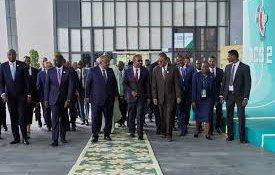African leaders and climate activists are calling for a transformative shift in global climate financing, urging the world to view Africa not as a climate victim but as a vital partner for investment.
At the second Africa Climate Summit in Addis Ababa on Monday, numerous heads of state and government officials highlighted the urgency of mobilizing resources to fund climate adaptation and renewable energy projects across the continent.
Ethiopian Prime Minister Abiy Ahmed opened the summit with a call to replace “climate aid with climate investment,” stressing that Africa’s resilience and renewable energy potential present vast opportunities. Ethiopia showcased its progress through initiatives like the Grand Ethiopian Renaissance Dam, set for inauguration on Tuesday, and its ongoing tree-planting campaign, which has already planted 48 billion seedlings in the past seven years.
African Union Commission Chairperson Mahamoud Ali Youssouf emphasized the need for fairness in addressing the climate crisis:
“The vulnerability of our member countries, caused by climate change, debt burdens, and the structural inequalities of the global financial system, must be addressed through climate justice. Genuine cooperation is essential for implementing our continent's adaptation plan, with financial resources, technology, and expertise.”
Kenyan President William Ruto echoed this call for unity, warning against isolationist approaches:
“The truth is clear. No country can tackle this crisis alone. Only through bold, united, and sustained collaboration can we avert a climate catastrophe. Isolation is not a solution—it’s a path to failure.”
The summit takes place amidst escalating climate disasters in Africa—droughts, floods, and food insecurity—that have disproportionately affected vulnerable communities. While African nations set ambitious renewable energy goals at last year’s climate summit, progress has been slow due to limited financing.
Civil society advocates urged leaders to ensure accountability and explore innovative funding mechanisms. Climate justice activist Amos Wemanya of Greenpeace Africa emphasized the need to hold major polluters accountable:
“This summit must find ways to fund Africa’s climate actions and development. We need to make the polluters who caused this climate crisis pay for it. We must tax the polluters and the super-rich to generate the resources and make them pay for the damage they’ve caused to our continent.”
Environmental activist Hindou Oumarou Ibrahim cautioned against “too much talk and not enough action,” calling for African-led solutions that prioritize community-driven adaptation strategies.
Delegates are expected to finalize a declaration this week that will capture Africa’s priorities, which will be presented at COP30 in November. COP30 President Ambassador André Corrêa do Lago attended the summit and expressed his support for Africa’s vision.
Prime Minister Ahmed concluded Africa’s message to the world: “We ask our global partners not to fund us because we are affected, but to invest with us because we are visionary.”
